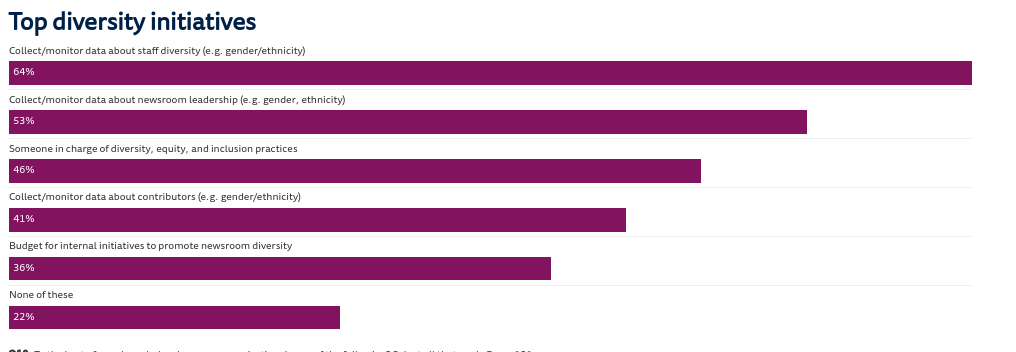A short one today, as I’m feeling burned out. I may take the advice of a good friend and take a few days to relax. Something I don’t know quite exactly how to do.
The media industry is at an inflection point, trying to course correct decades of inequalities. This is a good thing, even if it means some short term struggle for some of us middle age white men.
Newsrooms believe they are a meritocracy. Reader, they are not. There’s lots of failing upwards, usually by, ahem, middle age white people.
Diversity isn’t a check-the-box action. Organizations need to think beyond hiring, but the policies and practices they put in place.


It’s about paying people the same money for doing the same job. (Please read this thread)

A recent Reuters Institute report showed that “diversity is also reflected in the sources, contributors, and interviews that a newsroom selects.”
The survey also found
A clear majority of respondents (80%) believe their organisation has done a good job when it comes to gender diversity. But the figure drops to 45% when it comes to political diversity, 43% when it comes to ethnic diversity, and 40% when it comes to diversity in terms of less advantaged groups.
At a Zoom panel earlier this week at Temple University’s Klein College of Media and Communication, discussion between Klein College’s Lu Ann Cahn, WHYY’s Sandra Clark and Report for America’s Steven Waldman focused on diversity in the newsroom.
“I’m optimistic about diversity, because I feel like I’ve seen in the last few years employers wake up,” Cahn said. “I’m concerned, however, about this next generation and keeping some great talent in the field of journalism. I see a lot of fear about going into this business for a number of reasons.”
These fears, which the panelists said include financial stability, the lack of diverse support in newsrooms and an insufficient pipeline to journalism for people of color, still need to be solved before diversity will be achieved inside news organizations.
“[Newsrooms] are putting way too much burden on this reporter to solve all of their problems,” Waldman said. “There’s a lack of representation, or all these communities that have been covered horribly for 75 years, and you’re putting this reporter in there and expecting that reporter to regain the trust of that community.”
The panel concluded that newsroom training, more paid opportunities for aspiring reporters of color and hiring diverse journalists for their community understanding rather than the diversity box that they check are some steps to solutions news organizations can take.
“The whole diversity picture is much more than a person,” Clark said. “It’s really a mindset.”
One thing to consider: in order to change the system, there needs to be a pipeline. Media companies would be wise to build that pipeline now, mentor and coach younger staffers to become better managers, and lean on expertise and experience of older staffers to help push the company forward.
The problems have been pointed out, now it’s time to go beyond “just hiring diverse backgrounds” and put in equitable policies. Everyone will be better off.
Thank you for allowing me in your inbox. If you have tips or thoughts on the newsletter, drop me a line. Or you can follow me on Twitter. If you appreciated this edition, please consider sharing across your social networks. Thanks for reading!
If you’re a newsroom hiring manager and looking for an experienced reporter, editor or manager, please let me know.
Crosby, Stills & Nash, “Helplessly Hoping”
Some interesting links:
For profiles:
George Clooney when we need him most (GQ)
For ad creatives:
What makes an iconic ad? (Ad Age)
For platforms:
Facebook and Twitter chart out different paths for Congress on internet regulation (CNN)
YouTube Launches Audio Ads and Ad-Targetable Music Lineups, Taking Aim at Spotify (Variety)
Why Isn't Susan Wojcicki Getting Grilled By Congress? (Wired)
Google moves into Venmo, banks’ territory with checking accounts and updated payment app (CNBC)
For presidential media criticism:
What Obama gets right — and very wrong — about the media (Washington Post)
A Trump Memoir Would Sell. Will Publishers Buy It? (NYT)
For ad tech:
PubMatic Joins Industry-wide Unified ID 2.0 Initiative for an Alternative to Third-Party Cookies (Pubmatic)





